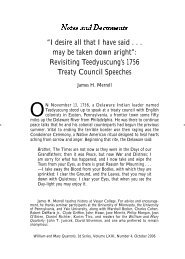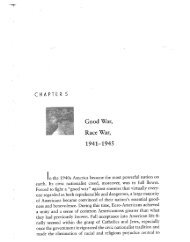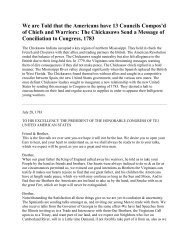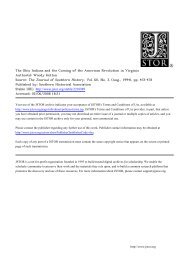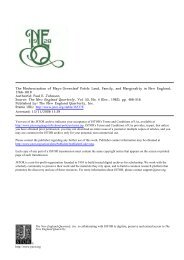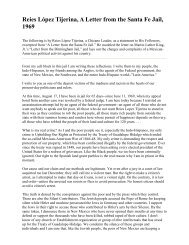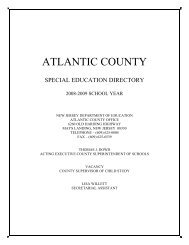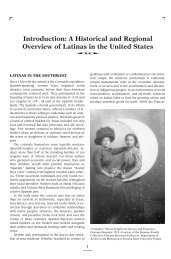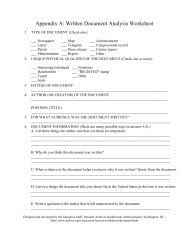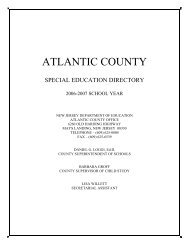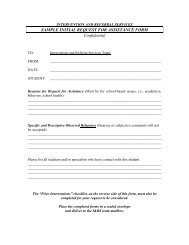The Terrain of Freedom: The Struggle over the Meaning of Free ...
The Terrain of Freedom: The Struggle over the Meaning of Free ...
The Terrain of Freedom: The Struggle over the Meaning of Free ...
Create successful ePaper yourself
Turn your PDF publications into a flip-book with our unique Google optimized e-Paper software.
110 History Workshop Journal<br />
Yankees had established an early foothold during <strong>the</strong> war, hundreds <strong>of</strong><br />
black men had entered <strong>the</strong> Union army, and <strong>the</strong> first 'rehearsal for<br />
Reconstruction' had been staged.' And <strong>the</strong>re, by order <strong>of</strong> Union General<br />
William T. Sherman, freedpeople had taken possession <strong>of</strong> thousands <strong>of</strong><br />
acres <strong>of</strong> plantation land. <strong>The</strong>re, in short, <strong>the</strong> revolutionary dimensions <strong>of</strong><br />
<strong>the</strong> Civil War came most fully into focus.<br />
<strong>The</strong> documents that follow <strong>of</strong>fer a brief but striking glimpse <strong>of</strong> <strong>the</strong><br />
confrontation in postwar South Carolina. <strong>The</strong>y form part <strong>of</strong> a sweeping<br />
story being presented by <strong>the</strong> <strong>Free</strong>dmen and Sou<strong>the</strong>rn Society Project. In<br />
<strong>the</strong> fall <strong>of</strong> 1976, with a grant from <strong>the</strong> National Historical Publications and<br />
Records Commission (and, later, with support from <strong>the</strong> National Endowment<br />
for <strong>the</strong> Humanities), <strong>the</strong> editors <strong>of</strong> <strong>the</strong> project set out to write a<br />
documentary history <strong>of</strong> American slave emancipation, based upon records<br />
in <strong>the</strong> National Archives <strong>of</strong> <strong>the</strong> United States.2 Here was an unparalleled<br />
collection <strong>of</strong> documents revealing <strong>the</strong> triumphs and tragedies <strong>of</strong> ordinary<br />
people in <strong>the</strong> midst <strong>of</strong> one <strong>of</strong> <strong>the</strong> most extraordinary events in modern<br />
history. After examining almost two million items, <strong>the</strong> editors selected,<br />
indexed, and cross-referenced more than 40,000 to serve as <strong>the</strong> basis for<br />
<strong><strong>Free</strong>dom</strong>: A Documentary History <strong>of</strong> Emancipation, 1861-1867, a multivolume<br />
history combining interpretive essays with documents. Two<br />
volumes have already reached print: <strong>The</strong> Black Military Experience<br />
(Cambridge University Press, 1982) and <strong>The</strong> Destruction <strong>of</strong> Slavery<br />
(Cambridge University Press, 1985). A third, <strong>The</strong> Wartime Genesis <strong>of</strong> <strong>Free</strong><br />
Labor, is nearing completion. <strong>The</strong> number and titles <strong>of</strong> subsequent<br />
volumes remain to be determined, but <strong>the</strong> editors have begun to transcribe<br />
and organize documents for volumes relating to land, labor, and capital in<br />
<strong>the</strong> postwar period. <strong>The</strong> documents that follow are drawn from that<br />
material. <strong>The</strong>y have been transcribed exactly as written, with no<br />
'correction' or 'modernization' <strong>of</strong> spelling, punctuation, capitalization, or<br />
syntax. Extra space has been added to mark <strong>the</strong> end <strong>of</strong> unpunctuated<br />
sentences; ellipses designate material omitted by <strong>the</strong> editors; words or<br />
letters supplied by <strong>the</strong> editors are enclosed in brackets.<br />
I<br />
Most Sou<strong>the</strong>rn planters acknowledged emancipation as an established fact,<br />
but few accepted <strong>the</strong> new relations and behavior that free labor appeared to<br />
demand. Like masters and lords in o<strong>the</strong>r servile societies, <strong>the</strong>y saw <strong>the</strong>ir<br />
dependents as lazy, irresponsible, unreliable, and wholly incapable <strong>of</strong><br />
performing <strong>the</strong> tasks necessary to commercial agriculture without compul-<br />
sion. Surrendering <strong>the</strong> prerogatives <strong>of</strong> absolute authority thus proved<br />
discomfiting enough; bargaining with ex-slaves in <strong>the</strong> marketplace seemed<br />
almost unimaginable. In a letter to <strong>the</strong> Union military commander <strong>of</strong> South<br />
Carolina, Joseph Daniel Pope, a planter on <strong>the</strong> sea islands that fringed <strong>the</strong>



